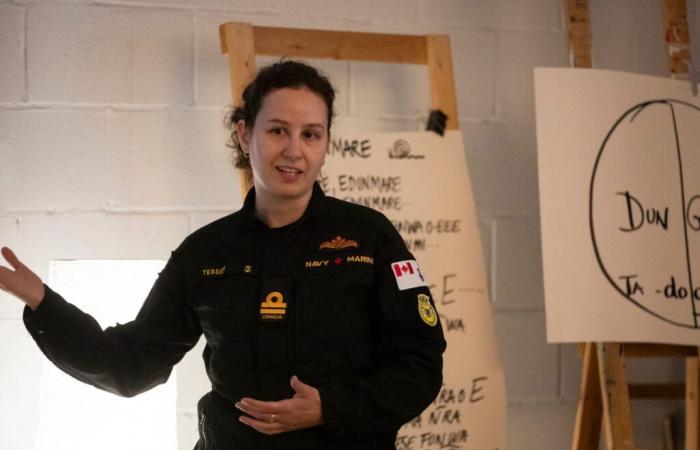In honor of the Earth Day, the lieutenant in the Canadian Armed Forces (FAC) Kate Tessier was able to share in fifteen people gathered at the Haut-Richelieu Women Center on April 22 her experiences in Lentus operations, whose mission is to intervene during natural disasters.
Floods, pandemic and forest fires: Lieutenant Kate Tessier saw them all. As a reservist in the Canadian Royal Navy, the Lieutenant Tessier was sent to the land in reinforcement from local authorities several times, through Lentus operations.
These operations constitute the response of the army to natural, but also human disasters, which go beyond the capacities of police and local governments. The Government of Canada’s website specifies that there have been more and more Lentus operations since 2010, and therefore that there is an increase in natural disasters in the country.
The conference, which was held on April 22, was organized by the Women Center in collaboration with the Iglu of FAC program. The IGLU program is an initiative of the association of the leadership and recruits school, based in Saint-Jean-sur-Richelieu, which aims to support military families.
On the ground
Kate Tessier engaged in the Navy reserve in 2013 part -time. As a basic naval owner stationed in Trois-Rivières, she participated in the operations in support for the floods in 2017 and 2019, then that to fight forest fires in 2023.
Each time, the aid provided by the FAC is prepared in less than 72 hours. The soldiers have a few hours to prepare for their departure and go there, often for an even indeterminate duration.
-In a Lentus operation, the tasks are varied: preparation of sandbags, construction of temporary bridges, displacement of residents, surveillance and security of the military in the quarter of rest … The hours can also be atypical. In 2019, it was in Sainte-Marie-de-Beauce that the lieutenant was able to lend a hand. For five weeks, seven days a week and 7 a.m. to 9 p.m., it mainly contributed to the filling and distribution of sandbags.
The forest fires of 2023 brought Kate Tessier to Sept-Îles, then to Baie-Comeau, and finally to the Micoua camp, further in the interior of the land. She wore several hats there: security officers, peloton commander and liaison officers. A two -day training was given by the sopfeu to the members of the navy before they arrive on the ground, since they are not trained for fires in the same way as the military of the army.
Feminine
“The navy is very feminine compared to other elements [de l’armée] », Kate Tessier answers the question of a participant. According to her, almost 30 % of her team at Camp Micoua was made up of women.
She says she saw a change in the attitude of the armed forces towards women since her enrollment over ten years ago. “We have put a lot of effort on the change of culture,” confirms the lieutenant Tessier. Ethics and harassment training are now given to recruits.
Changes are also carried out as to the preparation of reservists for natural disasters. “We are trying to develop our expertise through exercises that we do during the year,” explains Kate Tessier.
This is done through joint exercises with the army, where a disaster staging is organized. “This year it was in Montreal. We pretended that there was an earthquake. There are situations that arrive and we must manage them with our colleagues from the army. This is more like that we adapt, ”describes the lieutenant.






